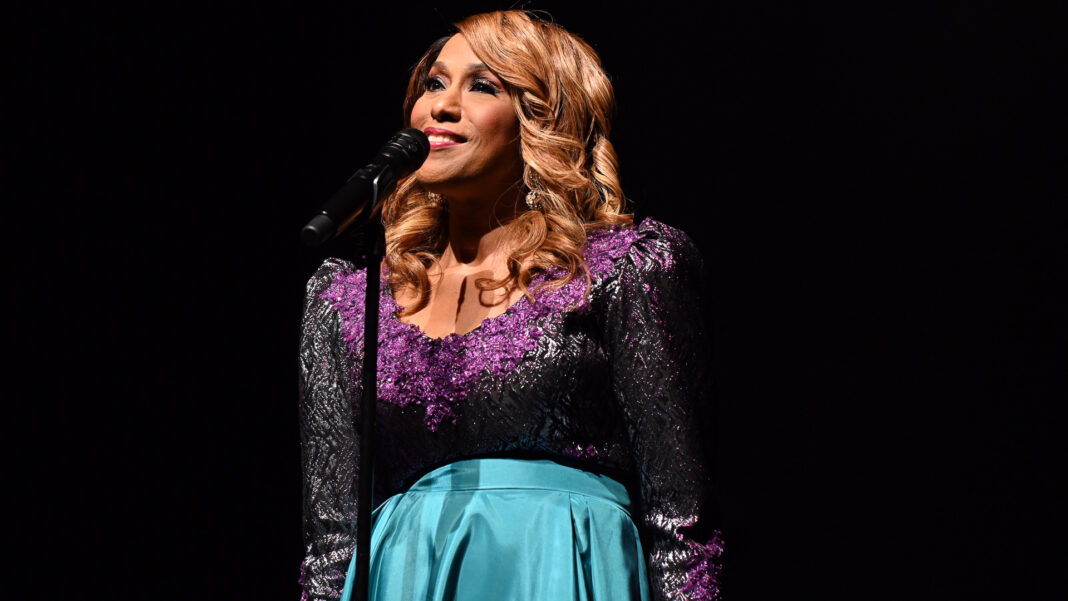
How many people get reviews like this? In 1981, Frank Rich of the New York Times called her performance, “one of the most powerful theatrical coups to be found in a Broadway musical since Ethel Merman sang ‘Everything’s Coming Up Roses’ at the end of Act I of Gypsy.” 40 years later Jesse Green in the same paper said the best moment of the 2021 Tony Awards was her performance of the same song Rich raved about. So it goes for Tony Award-winner Jennifer Holliday (Dreamgirls) who will be performing on Saturday at The Wallis in Beverly Hills. (She’ll probably be booking a lot more dates after the overwhelming acclaim she received after the Tony Awards.)
If you’ve never seen her perform And I Am Telling You I’m Not Going (which I was lucky enough to see her perform twice at the Shubert Theatre in Century City), take a look here.
Four days before she made mincemeat of the roof of the Winter Garden Theater, Holliday and I spoke by phone. She was in New York for Tony rehearsals. What follows are excerpts from our conversation that have been edited for length and clarity.
When you when you first started out, could you imagine having a career that would go over 40 years? And what does it mean to you that you have.
No, I couldn’t have imagined it. I really was not trying to be in show business. That was not my goal. I discovered singing in the church choir. My first show was Your Arms Too Short to Box with God because I was just doing that for a little while and then I’d come back home. But I went up to audition when Michael Bennett saw me for Dreamgirls. I was like, oh, OK. Unfortunately I never did get to college. So that’s that’s the only drawback.
During rehearsals for Dreamgirls, director Michael Bennett gave you videos of Barbra Streisand performing to watch. How much of what you learned during that production has stayed with you and remains part of how you perform today?
A great deal of it. First of all, I taught myself how to hold my notes long like she did. Because I don’t have a trained voice and I don’t think she does either. I would be so curious, like, how is she holding that note so long? [Streisand] was the first. I had never seen anybody like her. I never knew who she was. And so a lot of that just stayed with me.
And then I incorporated it. And I Am Telling You I’m Not Going that was not a part of the original kind of feeling of it. And in fact, everybody wanted me to take it out, especially David Geffen with the record company. [He] said “Why you got to hold that note so long. You’ll never get any radio play with that. Nobody’s going to listen to that if it’s soft like that in the middle, you know?” And I was like, well, I don’t know. But Michael Bennett agreed with me, said, “Well, we’re not really talking about records right now. She likes it and I like it.“
Thank God I still have the lilt in my voice and the belt. Even though I don’t sing as high as I used to sing, I still get pretty good pretty much up there.
Other actors who worked with Michael Bennett have talked about how cruel he could be. (See how his collaborator, the late Bob Avian, talked about that cruelty here.) What was your experience and how do you look back on that time with him?
I actually had a different experience with Michael Bennett. I’ll be honest with you. This is the part that I haven’t really discussed at all. The only thing I felt that he was cruel towards me is that he inserted himself as a Svengali. So him being a gay man and me being a young woman kind of made me foolishly believe that he actually loved me. And I thought that was cruel because that was not ever going to be anything like that, but I really was young. I didn’t know, you know what I’m saying? So that’s the only thing. I didn’t see that then and boy did I care back then.
You did a television interview that I saw from 1981 and you were asked where do you get the pain that you put into your singing voice as it relates to And I Am Telling You I’m Not Going. And you said it was the experience of being on the road and leaving home at eighteen. Forty years later you still maintain that pain in every performance I’ve ever seen. What’s the source of that pain today?
I think that I have suffered greatly with depression, clinical depression, pretty much my entire adult life. And so I think that there is balancing that is there. And, you know, still the loneliness, even after all of these years, you know, of being on the road and traveling and doing all these things. And so to me, it’s still there. So I think that’s kind of in my voice. What I usually try to do now is balance my concerns now with something that speaks of joy and that I can still think of love and all that does, that kind of thing and not be concerned about it.
What I’ve learned now, which I didn’t know, is that there is no time limit or cut off time for growth. You can still grow and mature and change and become the person you want to be and just keep learning.
That growth was apparent in a 2013 interview you did with NPR. You told them your perspective on life was “Don’t try to figure out the ending of the movie. Stay to see it. Don’t don’t try to figure out how to play it because it takes different twists and turns.”
It really does. And especially with show business, it’s so up and down. It’s really a hard business. And sometimes, you know, you just kind of go, “I want to give up, I want to do whatever.” Because you just feel like you’re not making anything in this. So that’s that kind of thing. You got to just stay for the whole movie. It’s a slow movie, but, you’ve got to stay.
At what at what point did you come to the realization that that was the best way to deal with both the highs and the lows of doing what you do?

Unfortunately, late in life. Finally I felt like I had found a way to cope with my heartaches and setbacks and disappointments. This is a rough business and people make so many promises that just never come, you know? So you waste a lot of time with a lot of people sometimes who just say they’re going to do things for you. They probably have good intentions, but some things just don’t manifest.
And so when I was turning 50 and I was like, OK, I’m not really anywhere right now and I don’t really know what’s going to become of my career or anything. And I said, but for the first time, I’m not going to be trying to call around and see what’s going to happen or make anything happen. I’m just going to feel this. Things could turn around. That’s when I really felt that I had learned a lot about my own self. I was beginning to learn how to love my own self.
I knew that I had preserved my instrument, my voice…if I could just hold on. A lot of times in show business it is later in life that you get your just reward, you know? And I just ask God. I said, if I could just live long enough to get that third act. So to me, I feel like I’m on the verge of my third act, especially here coming full circle with returning to the Tony Awards to do my number. To feel Effie, Michael Bennett and all of the people. I feel like I’ll they’ll all be with me Sunday, you know? OK, this is going to be your third act and what will be a new beginning.
For tickets to see Jennifer Holliday at The Wallis in Beverly Hills, please go here.
All photographs of Jennifer Holliday courtesy Jennifer Holliday and The Wallis












Hi I am a fan who would like to see Ms. Holiday in concert in Los Angeles, CA this time one of the greatest singers of all times Listen to her music every day good bless you.
So happy for Jennifer Holiday. She is so talented and real! The pain and now the glory. Her faith is wonderful! Always a fan!!
Jennifer has so impressive, yet so talented. What a blessed and loved gift which she shares on going…..
I remember seeing Jennifer Holiday in the Original Dreamgirls in NY, and when I tell you, that the second she belted out the first note to “And I’m Telling You,” the audience, including myself, were on its feet. I thought her voice was going to blow the roof off the building-that’s how powerful her voice was. No one can, not sing, but Sang that song like Ms. Holiday. I’m so honored I got the chance to see her!!